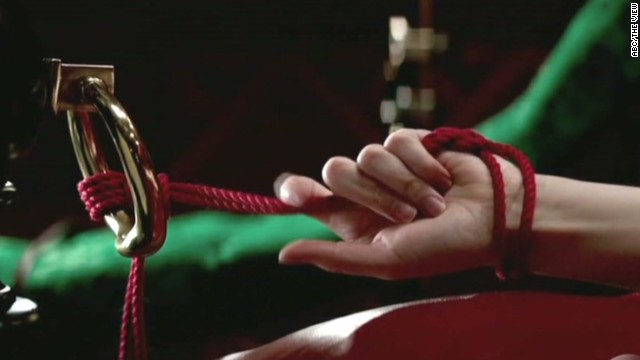As a high school teacher, you learn very quickly what is in the collective imagination of young people. For example, last year around this time, 50 Shades of Grey came out, and though it wasn't discussed widely among the student body (at least not in front of me), it was quite obvious that they were well aware of the movie's content. One senior asked me, "What's the Church's position on something like bondage, etc. within marriage"?
This should give you some idea of just how casual such talk had become. In any case, because this particular class was a little rougher around the edges than some of the other classes (I called them my Welcome Back Kotter class), I decided to take up the question. After all, I reasoned, I don't want them to think that the Church is afraid to answer such questions confidently and with clear rationale.
However, my deeper concern was that these students, like society in general, would come to accept the pernicious lie that "dirty sex" was somehow more pleasurable and fulfilling than genuine intimacy. Setting aside the bizarre notion that health consists in feeding perversion, how does one exactly respond to such a question in a meaningful way?
OK, this is what to avoid. But can Godly intimacy truly provide a positive alternative?
In some ways all of the former's pleasures are legitimate. Yet the problem isn't with sexual pleasure, the problem comes down to the means by which we obtain them. If we are simply using another person as an instrument and object from which to derive pleasure, we cannot help but to literally treat them as something disposable. For the moment any object ceases to accomplish its objective (viz. sexual pleasure), it immediately becomes something expendable.
Yet, once again, the problem isn't that we want love to be ever-new or exotic, it is that we almost prefer the experience of the "strangeness" of the circumstances to the people themselves. More specifically (and dangerously), we separate the pleasure from the person.
The ultimate source of pleasure is not a pharmaceutical drug, nor is it the perfect sexual move or device- rather, it is the virtue of gratitude. While the former may deliver a great deal on the front end, one is far more likely to lose everything on the back. Like the story of the Prodigal Son, we want to receive everything at once- without any mind for what it actually takes to maintain our inheritance.
The lustful one is always hankering for the pleasures yet to be obtained, while the eyes of gratitude are like the child on Christmas morning- unable to decide precisely where to begin. The eyes of lust are the eyes of a hung-over drunk looking for the "hair of the dog that bit them," while the eyes of gratitude are consumed with wonder over the fact that there is such a thing as sex in the first place, or as G.K. Chesterton so aptly put it in his biography of St. Francis; "Blessed is he that expecteth nothing, for he shall enjoy everything", and also this gem from his book Orthodoxy; "I could never mix with the common murmur against monogamy, because no restriction on sex seemed so odd as sex itself… Keeping to one woman is a small price for so much as seeing one woman."
Yet the secret to this divine sense of gratitude involves not only an appreciation for the feminine, but also for the astonishing little things that surround us every day. The problem for us arises from the fact that awe and romance are not simply a kind of reflex (though we want them to be), but rather a virtue that must be practiced on a continual basis. One must truly take the time to- as one might say- "smell the roses", but even more importantly, one must take the time to literally thank God for the sweet fragrance that accompanies the flower.
Praise is always particular, and never generic (i.e. thanking God for nature in general). Each man should be in the business of creating, as it were, his own encyclopedia of awe. For any one who begins such a list will quickly discover that there really is no end to it. So grateful will he be, that he will find himself seeking to make a return, not in the spirit of one who expects something compensation, but in the spirit of George Bailey.
One can never truly repay God for all the good that he has wrought in our lives, but we can honor Him by using his gifts as they were originally intended. Perhaps this is why little children so often chat with inanimate toys. They are like St. Francis or George Bailey, praising everything in creation simply for existing: "Hello, Bedford Falls! Drafty old house! Broken knob on the stairwell! Hello brother sun, sister moon, blood from a punch in the mouth… And did you know that I'm going to jail for some unpaid debts… isn't that great?" (is there better proof for the joy of purgatory than this). The fact that things exists at all (as opposed to not existing), even when they are imperfect (perhaps especially when they are imperfect), becomes a kind of natural aphrodisiac injected into the bloodstream and into the mind of the man who sees things from this perspective. The fact that there are restrictions placed on creation is a small price to pay for the delight of being a participant.
And so it is that we return to our initial question in order to answer the latter. What could possibly explain society's recent fixation with BDSM, especially in light of the beautiful alternative? In keeping with our previous theme, if love and sex are really to be equated with a game, then BDSM must be a game of a different sort; one that sacrifices agape love for the sake of erotic love, one that makes human interaction entirely optional. Vulnerability in this case is not the gift of one lover to another. To the contrary, it is the usurpation of said vulnerability by an act that would otherwise be regarded as violent. Mystery (in this case) is not cultivated by a sense of gratitude and creative imagination, but rather by a creepy and sinister masquerade.















